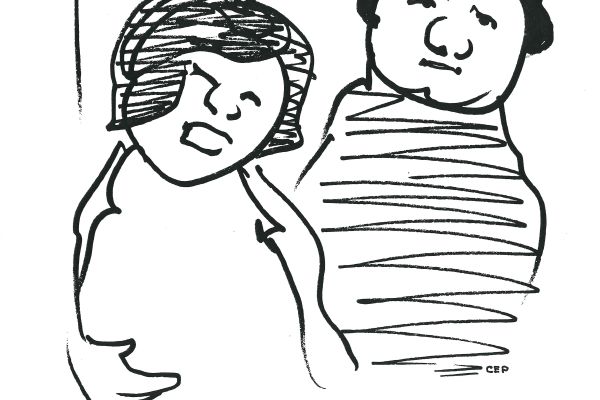Parental Burnout and Stress
Raising children can be immensely joyful, but parents must be prepared for feelings of exhaustion or burnout, especially after the birth of a child, and for stress and anxiety as children grow up and resist their guidance or take greater risks. And some couples will face the unthinkable loss of a child, and the struggles to recover.
Burnout is not only caused by working too hard at one’s job. Parenting and other forms of caregiving frequently lead to exhaustion, stress, and overwhelm that, left unchecked, can bring on the emotional, mental, and physical symptoms of burnout, including feelings of cynicism, lethargy, and, often, depression. Parents, like others who experience burnout, may hide their symptoms, fearing the stigma of being seen as not good enough or strong enough, but without attention and treatment, a mother’s or father’s burnout can have detrimental effects on an entire family.
For more, see Burnout
In some surveys, as many as 60 percent of parents have reported experiencing feelings if burnout at some time. But many parents resist admitting that they are burned out, and so they do not receive help. People often believe they are expected to be superhuman when it comes to caring for their children, and burnout can make parents feel inadequate.
One of the most concerning symptoms of parental burnout, research finds, is feelings of escape ideation—imaging what it would be like to walk away from family responsibilities altogether. Such feelings, left unaddressed, could spiral into neglectful or abusive parenting or even abandonment. Feeling like being on autopilot, or feeling detached from their children, can leave children feeling unloved.
Often, it is the parents most committed to their roles who are at highest risk of burnout. The pressures some mothers and fathers put on themselves in the pursuit of perfectionism can put them at risk of never feeling good enough. Easing up on perfectionism, establishing more consistent routines for their parenting day, committing to self-care, even for short periods of time, and finding support can help parents avoid burnout.
When parents experience burnout, research suggests, they can cut back on chores and bring in assistance from family, friends, or paid help; pay less attention to parental expectations for child-development milestones or nutrition or screen-time targets; and to take the time to identify the issues that cause them the most stress and focus on those rather than their entire identity as a parent.
The arrival of a newborn can have a significant impact on a couple’s sex life, because of the time parents need to devote to childcare, and because while new mothers’ desire for sex may decrease during the postpartum months, men may be less affected, leading to large differences in desire, and ensuing conflict. Several large-scale studies have found a general decline in relationship satisfaction after a child’s birth, with women typically reporting a greater drop than men. Intensive couples counseling for new parents has shown some promise in helping couples stay connected, but smaller-scale practices, like brief moments of physical affection like hugs and snuggling, unexpected kind gestures, expressions of gratitude, and going to bed at the same time can all help partners maintain their connection.
Experts in managing new mothers’ mental health emphasize that they must prioritize their self-care, including nutrition, exercise, sleep, social support, and time for self. To that end, maintaining hydration, taking regular walks, reducing caffeine, finding alone time, and asking family and friends to help with specific tasks can all benefit their mood and mental health.
For many years, research on new fathers was largely ignored in the clinical conversation about postpartum mental health. We now know that becoming a father triggers significant changes in men, including major hormonal shifts, increased relationship stress, and psychological pressures that challenge their identity. And while some research suggest that new fathers experience bouts of depression at nearly the same rate as new mothers, they are far less likely to be treated. Given the proven benefits of an engaged father in a young child’s life, new fathers and mothers must monitor each other, and urge their partners to get help if it seems necessary.
New parents who experience unsettling and pervasive symptoms of anxiety, but not symptoms of depression, may have postpartum anxiety, a common and treatable, but widely underdiagnosed condition. Postpartum anxiety may manifest in panic attacks or generalized anxiety, or with some symptoms of OCD or PTSD. People with a personal or family history of anxiety may be especially prone to postpartum anxiety, but any new parent experiencing disruptive symptoms should seek help from a therapist.
All new parents know how much a newborn can disrupt their sleep, making them feel less mentally sharp and more irritable, but they may still underestimate the wider effects of sleep loss. Studies of sleep-deprived new parents have found that they may have a lessened ability to express joy, including changes in their facial expression and vocal tone, and they may appear sadder to others, all of which could have an effect on establishing an emotional connection with their infants.
As many as 60 percent of new mothers experience feelings of postpartum depression (PPD). These feelings of anxiety, irritability, and confusion, coming at what is supposed to be one of life’s most joyous moments, can be disorienting and unmooring, and lead to crying spells, sleep and appetite problems, and in extreme cases, violent or suicidal thoughts. When such feelings only last for two or three days after the birth of a child—the “baby blues”—they are not generally considered clinically serious, but if feelings endure for two weeks or longer, they should be treated with professional care.
For more, see Postpartum Depression.
Postpartum depression is not widely understood by those who have not experienced it. In half of women with postpartum depression, for example, symptoms begin during pregnancy, and in many others, symptoms do not appear for weeks after delivery. Some experts suggest that doctors should consider postpartum depression as a diagnosis anywhere from six months before birth until a year after.
Any new parent can experience symptoms, but research has identified several potential risk factors for postpartum depression, including marital stress, poor social support, the recent death of a loved one, hormonal imbalance, smoking, and a history of anxiety or depression. Awareness of one’s risk factors, and a willingness to seek help when symptoms occur, can lead to effective treatment and limit the potential effect on child development and family relationships.
Most new mothers cry, which is understandable given the exhaustion and overwhelm of becoming a parent. But those experiencing postpartum depression may find themselves crying all day, and feeling unable to function. And while many new parents are tired, those with postpartum depression may want to sleep all the time, or, in some cases, find themselves unable to sleep at all. New parents experiencing these symptoms, or others such as intense rage, thoughts of self-harm, or a fear or aversion to their baby, should seek help.
Treatment for postpartum depression generally includes talk therapy, antidepressants, hormonal therapy, and support group attendance, often in combination. But while antidepressants typically take several weeks to work, a new medication recently approved for use by the U.S. Food and Drug Administration, known as brexanalone, can alleviate symptoms in just two or three days with benefits that can last a month. The drug must be administered in a hospital, and availability is currently limited, but it represents a promising step forward.
Yes. Research suggests that as many as 1 in 4 men experience symptoms of postpartum depression during the year after the birth of a child. Studies find that men tend to respond to the feelings by detaching or isolating themselves, and they are less likely to seek help or treatment than mothers are, because of denial, stigma, or social expectations. Clinicians advocate for couples seeking treatment for postpartum depression together, no matter which parent is experiencing the more severe symptoms.
Research has shown that new fathers are vulnerable to depression, and that depressed fathers are less engaged with their children. But recent studies have found that it may actually be a lack of engagement with their newborns that drives depression in some new dads. Fathers who spent more time with their infants were found less likely to be depressed a year later, a clear benefit for families and a strong argument for paternity leave policies.














